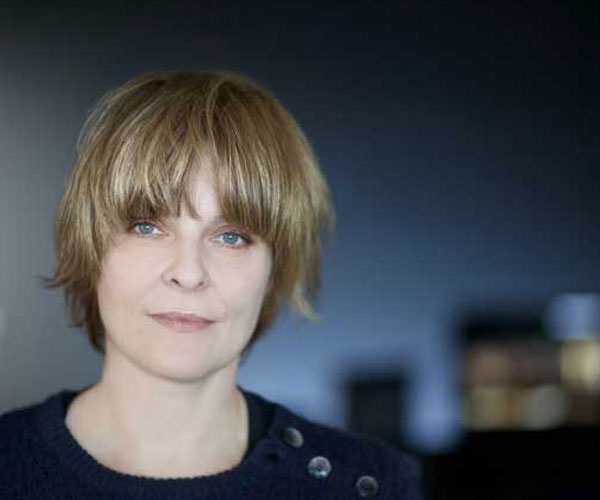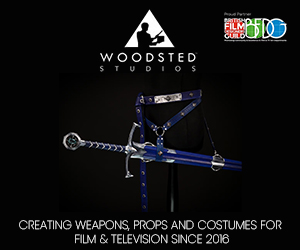Broadcast News
01/02/2017
A Life In Colour: A Q&A With Aline Sinquin

French born, Aline Sinquin first intended to be a DoP, but when she encountered colour grading, she could not let go.
Aline's creative energy and passion is apparent in her entire body of work where she has worked across many brands, and with acclaimed directors. Today she is leading her own specialist colour grading boutique in the heart of Soho in New York.
How did you make your start in colour?
I started at Duran Paris as an assistant. I was working on 35mm on an URSA Diamond telecine – it was a while ago. As Duran was very successful, we acquired another telecine, a C-Reality, and I started grading on S8mm projects at the same time as I was assisting. It was a crazy and intense creative period in Paris – you had to grade in tight timescales. I enjoyed it a lot.
You've been a colourist in several major cities. Did you find any differences in the way you worked in different countries?
I've worked mainly in Paris, London and New York. What emerged from those experiences is that the way of working varies considerably from one culture to another. I'd say that in France, we are more "artisans". Grading sessions are usually very long and particularly picky. French people have this taste and energy for speech, and there are a lot of discussions during a session with the directors and DOPs. Our natural critical state of mind often makes sessions very intense and passionate – which explains why they can be so long too.
When I arrived in London, it was a cultural shock really, but in a good way. I had never envisioned how two countries so close geographically could be so drastically different. I spent two years in London and learned a lot. I was amazed by the creativity of the colourists and their technical expertise. Clients there liked strong colours and strong looks, which I had never experimented with in Paris. I had to adapt myself and change my way of grading; work faster and push my creativity and my technical knowledge even further.
I live in New York now, and again things are different. While in Europe colourists work mostly with directors and DOPs, in New York we have to deal with editors and agencies. Colour grading can be just a step in the process of the fabrication of a film or a piece of art; it really depends on the clients. New York is such an amazing melting pot; you have all the types of people I guess. I'm lucky to have worked as well in Japan, Germany, Spain and India and this also reinforced the idea that colour is deeply cultural and its perception is varied.
Over the last decade, you have built an expansive portfolio of work in commercials and features. What draws you to these projects?
I'm lucky to have worked with huge personalities and really talented people during my career, and those things attract me to projects. They continue working with me and it's just fantastic.
Is there any type of project you like most?
I like all types of project really (even if I'm specialised in beauty ads).
Fiveonecolor is the first female colour grading company running on a Baselight in New York. What led to the opening of this new facility?
I was surprised when I realised that, and indeed how our industry in New York is predominantly masculine. I'm happy to start changing things a little bit. I'm lucky enough to have worked at prestigious places worldwide, all highly specialised in colour, and this experience has given me a strong knowledge and perspective of what colour grading is and what I can offer best to my clients and other colourists. It was just time for me to build my own company – to synthesize this knowledge and express myself as a colourist, different from other facilities.
Fiveonecolor offers technically the same high-end services as the biggest company in New York, running on a Baselight system, all 4K with an HDR monitor. Colour grading is a special process for my clients, and we spend time to welcome them, understand their needs and talk. We also do remote work with Los Angeles and Paris.
Why did you initially select Baselight over competitive products? Did your clients influence the purchase decision at all?
Clients in New York often understand that Baselight is better than any other grading system and that it can handle bigger jobs. I've experimented I think with all the different colour grading systems still on the market, and the Baselight system to me is just natural to work on. I've been using Baselight over seven years now. This system is created for colourists, and FilmLight as a company listens to our feedback so the system improves constantly. The control panel is also really designed to work long hours comfortably, with the colourists wellbeing in mind.
Most recently you've graded VR projects. What was your experience like creating the look of these stereo projects with Baselight?
Baselight's workflow for stereo is amazing and a major toolset for VR. Sometimes clients miss the fact that Baselight can correct the geometry, transform and colour for both eyes in just one click.
I love new technologies and VR is definitely a fun one that has just emerged recently. It gives you another comprehension of colour and makes you think about how to adapt your methods to colour grade it.
How would you define your personal style of grading?
I try to give to my clients the reflection of what they shot and make it as beautiful as possible. I'm not a big fan of strong looks; there are a lot of good apps for that now.
How do you keep up in our evolving film industry and keep current with emerging technologies, workflows, etc.?
The process of making a film, a video, a spot, etc., has become faster, especially in New York. So basically as a colourist you can always find a LUT to grade quickly. Colour grading has become globalized just like everything else in the world, and you can see a "look" from certain companies or groups to the detriment of individual creation. I had to adapt myself to work faster and embrace new technologies too, while still preserving my creativity and differentiating my work. Yes, I can give clients those "looks" but I'd rather not. That is actually why I opened my own company.
What do you like more about Baselight?
I like everything in Baselight, especially the 3D keyer which is a painter tool for me, but the strongest assets in Baselight are all the different ways to do contrast, which when mixed can create different textures. I've never seen such possibilities in any other system.
What is it about Baselight that helps your creative process?
The fact that you can add layers very fast and you never have video aberrations. So if you are in an intensive creative colour grading process, Baselight is following your mind and thought processes while the technical side of the system does not slow you down.
Fundamentally, what is the role of a colourist in building the story?
Colours are everywhere and are a big part in our life. The colourist has to find the best way to serve the purpose of the project and supplement the pictures. Colourists have to give to the film its "Romanesque" side.
What advice would you give to people interested in becoming a colourist?
I would just recommend them to find their own style as an artist.
Who is your inspiration?
I always keep an eye on colourists in London, who are to me really talented. I'm always looking for new photographers as well. I love 35 mm and try to keep it in mind when I work.
What do you like to do outside the colour suite?
Enjoy the sun! And cooking… old fashioned French recipes, Japanese food and also baking. My specialties? Seafood soups, and a very tasteful ginger financier, with tonka beans and caramelized pears.
What's for you next?
Another Baselight system and continuing colour grading. This is such a beautiful job.
fiveonecolor.com
Image: Aline Sinquin, Senior Colourist, Founder, Fiveonecolor.
Aline's creative energy and passion is apparent in her entire body of work where she has worked across many brands, and with acclaimed directors. Today she is leading her own specialist colour grading boutique in the heart of Soho in New York.
How did you make your start in colour?
I started at Duran Paris as an assistant. I was working on 35mm on an URSA Diamond telecine – it was a while ago. As Duran was very successful, we acquired another telecine, a C-Reality, and I started grading on S8mm projects at the same time as I was assisting. It was a crazy and intense creative period in Paris – you had to grade in tight timescales. I enjoyed it a lot.
You've been a colourist in several major cities. Did you find any differences in the way you worked in different countries?
I've worked mainly in Paris, London and New York. What emerged from those experiences is that the way of working varies considerably from one culture to another. I'd say that in France, we are more "artisans". Grading sessions are usually very long and particularly picky. French people have this taste and energy for speech, and there are a lot of discussions during a session with the directors and DOPs. Our natural critical state of mind often makes sessions very intense and passionate – which explains why they can be so long too.
When I arrived in London, it was a cultural shock really, but in a good way. I had never envisioned how two countries so close geographically could be so drastically different. I spent two years in London and learned a lot. I was amazed by the creativity of the colourists and their technical expertise. Clients there liked strong colours and strong looks, which I had never experimented with in Paris. I had to adapt myself and change my way of grading; work faster and push my creativity and my technical knowledge even further.
I live in New York now, and again things are different. While in Europe colourists work mostly with directors and DOPs, in New York we have to deal with editors and agencies. Colour grading can be just a step in the process of the fabrication of a film or a piece of art; it really depends on the clients. New York is such an amazing melting pot; you have all the types of people I guess. I'm lucky to have worked as well in Japan, Germany, Spain and India and this also reinforced the idea that colour is deeply cultural and its perception is varied.
Over the last decade, you have built an expansive portfolio of work in commercials and features. What draws you to these projects?
I'm lucky to have worked with huge personalities and really talented people during my career, and those things attract me to projects. They continue working with me and it's just fantastic.
Is there any type of project you like most?
I like all types of project really (even if I'm specialised in beauty ads).
Fiveonecolor is the first female colour grading company running on a Baselight in New York. What led to the opening of this new facility?
I was surprised when I realised that, and indeed how our industry in New York is predominantly masculine. I'm happy to start changing things a little bit. I'm lucky enough to have worked at prestigious places worldwide, all highly specialised in colour, and this experience has given me a strong knowledge and perspective of what colour grading is and what I can offer best to my clients and other colourists. It was just time for me to build my own company – to synthesize this knowledge and express myself as a colourist, different from other facilities.
Fiveonecolor offers technically the same high-end services as the biggest company in New York, running on a Baselight system, all 4K with an HDR monitor. Colour grading is a special process for my clients, and we spend time to welcome them, understand their needs and talk. We also do remote work with Los Angeles and Paris.
Why did you initially select Baselight over competitive products? Did your clients influence the purchase decision at all?
Clients in New York often understand that Baselight is better than any other grading system and that it can handle bigger jobs. I've experimented I think with all the different colour grading systems still on the market, and the Baselight system to me is just natural to work on. I've been using Baselight over seven years now. This system is created for colourists, and FilmLight as a company listens to our feedback so the system improves constantly. The control panel is also really designed to work long hours comfortably, with the colourists wellbeing in mind.
Most recently you've graded VR projects. What was your experience like creating the look of these stereo projects with Baselight?
Baselight's workflow for stereo is amazing and a major toolset for VR. Sometimes clients miss the fact that Baselight can correct the geometry, transform and colour for both eyes in just one click.
I love new technologies and VR is definitely a fun one that has just emerged recently. It gives you another comprehension of colour and makes you think about how to adapt your methods to colour grade it.
How would you define your personal style of grading?
I try to give to my clients the reflection of what they shot and make it as beautiful as possible. I'm not a big fan of strong looks; there are a lot of good apps for that now.
How do you keep up in our evolving film industry and keep current with emerging technologies, workflows, etc.?
The process of making a film, a video, a spot, etc., has become faster, especially in New York. So basically as a colourist you can always find a LUT to grade quickly. Colour grading has become globalized just like everything else in the world, and you can see a "look" from certain companies or groups to the detriment of individual creation. I had to adapt myself to work faster and embrace new technologies too, while still preserving my creativity and differentiating my work. Yes, I can give clients those "looks" but I'd rather not. That is actually why I opened my own company.
What do you like more about Baselight?
I like everything in Baselight, especially the 3D keyer which is a painter tool for me, but the strongest assets in Baselight are all the different ways to do contrast, which when mixed can create different textures. I've never seen such possibilities in any other system.
What is it about Baselight that helps your creative process?
The fact that you can add layers very fast and you never have video aberrations. So if you are in an intensive creative colour grading process, Baselight is following your mind and thought processes while the technical side of the system does not slow you down.
Fundamentally, what is the role of a colourist in building the story?
Colours are everywhere and are a big part in our life. The colourist has to find the best way to serve the purpose of the project and supplement the pictures. Colourists have to give to the film its "Romanesque" side.
What advice would you give to people interested in becoming a colourist?
I would just recommend them to find their own style as an artist.
Who is your inspiration?
I always keep an eye on colourists in London, who are to me really talented. I'm always looking for new photographers as well. I love 35 mm and try to keep it in mind when I work.
What do you like to do outside the colour suite?
Enjoy the sun! And cooking… old fashioned French recipes, Japanese food and also baking. My specialties? Seafood soups, and a very tasteful ginger financier, with tonka beans and caramelized pears.
What's for you next?
Another Baselight system and continuing colour grading. This is such a beautiful job.
fiveonecolor.com
Image: Aline Sinquin, Senior Colourist, Founder, Fiveonecolor.
Top Related Stories
Click here for the latest broadcast news stories.
11/04/2007
Colour Management and Extension 2 Add To Autodesk Lustre Colour Grading
Lustre Colour Management, now included in Autodesk’s visual effects, editing and finishing, and colour grading solutions, ensures that everyone across
Colour Management and Extension 2 Add To Autodesk Lustre Colour Grading
Lustre Colour Management, now included in Autodesk’s visual effects, editing and finishing, and colour grading solutions, ensures that everyone across
02/12/2004
FilmLight ships Baselight Four and Baselight Eight colour grading systems
FilmLight, pioneers of digital film technology, is now shipping its next generation of its Baselight colour grading systems, Baselight Four and Baseli
FilmLight ships Baselight Four and Baselight Eight colour grading systems
FilmLight, pioneers of digital film technology, is now shipping its next generation of its Baselight colour grading systems, Baselight Four and Baseli
15/11/2010
Cincinnati's Red Echo Post Adds Colour Grading Service Via FilmLight's Baselight
Cincinnati-based post house Red Echo Post has acquired a Baselight colour grading system from FilmLight to serve as the centrepiece of its newly-forme
Cincinnati's Red Echo Post Adds Colour Grading Service Via FilmLight's Baselight
Cincinnati-based post house Red Echo Post has acquired a Baselight colour grading system from FilmLight to serve as the centrepiece of its newly-forme
03/08/2018
Mumbai-Based Colourist Opens Up About His 14-Year Career
Mumbai-based senior colourist Swapnil Patole has opened up about his 14-year career where he has worked on a variety of projects in different formats
Mumbai-Based Colourist Opens Up About His 14-Year Career
Mumbai-based senior colourist Swapnil Patole has opened up about his 14-year career where he has worked on a variety of projects in different formats
23/05/2007
Colour Confidence Expands Colour Correction Software Range
Colour Confidence has announced the expansion of its colour correction software range, with the introduction of two new solutions from PictoColor. Aim
Colour Confidence Expands Colour Correction Software Range
Colour Confidence has announced the expansion of its colour correction software range, with the introduction of two new solutions from PictoColor. Aim
22/07/2005
Autodesk releases new versions of its visual effects, editing and digital colour grading systems
Autodesk has released new versions of its visual effects, editing/finishing and digital colour grading systems. Used to create high-value feature film
Autodesk releases new versions of its visual effects, editing and digital colour grading systems
Autodesk has released new versions of its visual effects, editing/finishing and digital colour grading systems. Used to create high-value feature film
30/10/2023
Big Pic Media Completes Colour Grading Suite
Big Pic Media has completed a colour grading suite at iGene Media's global headquarters in Chiswick Park, London. The recently established venture per
Big Pic Media Completes Colour Grading Suite
Big Pic Media has completed a colour grading suite at iGene Media's global headquarters in Chiswick Park, London. The recently established venture per
31/08/2018
Creativity Media's Matthew Troughton Talks Colour Grading
Creativity Media's Head of Picture Post and Senior Colourist Matthew Troughton discusses his career in colour grading, including his experiences using
Creativity Media's Matthew Troughton Talks Colour Grading
Creativity Media's Head of Picture Post and Senior Colourist Matthew Troughton discusses his career in colour grading, including his experiences using
15/03/2018
Windmill Lane Colour Department Talk About Their Projects
Dave Hughes and Matt Branton make up two thirds of the Colour department at Windmill Lane in Ireland. Together, they have worked on many projects from
Windmill Lane Colour Department Talk About Their Projects
Dave Hughes and Matt Branton make up two thirds of the Colour department at Windmill Lane in Ireland. Together, they have worked on many projects from
13/03/2017
Projected Image Solutions For Colour Grading
The use of projected images in colour grading environments is a long-established method of viewing grading material in the post-production process. Pr
Projected Image Solutions For Colour Grading
The use of projected images in colour grading environments is a long-established method of viewing grading material in the post-production process. Pr
07/02/2013
Studio l'Equipe Relies On Mistika For Colour Grading Toolsets
As part of the on-going expansion of digital acquisition, Brussels-based Studio l’Equipe, one of Belgium’s leading post production facilities has inve
Studio l'Equipe Relies On Mistika For Colour Grading Toolsets
As part of the on-going expansion of digital acquisition, Brussels-based Studio l’Equipe, one of Belgium’s leading post production facilities has inve
18/06/2012
Rushes Announced Simone Grattarola As Director Of Colour Grading
Rushes have announced Simone Grattarola as Director of Colour Grading. Award winning Colourist Simone has over 12 years grading experience working wit
Rushes Announced Simone Grattarola As Director Of Colour Grading
Rushes have announced Simone Grattarola as Director of Colour Grading. Award winning Colourist Simone has over 12 years grading experience working wit
01/12/2010
The Pixel Farm Releases Free Airgrade Colour grading iPhone App
The Pixel Farm, developers of film industry-renowned VFX software, has announced the release of Airgrade, a new, free-of-charge, colour-grading engine
The Pixel Farm Releases Free Airgrade Colour grading iPhone App
The Pixel Farm, developers of film industry-renowned VFX software, has announced the release of Airgrade, a new, free-of-charge, colour-grading engine
09/06/2010
Egg Cracks Real-Time Colour Grading
A specialist in innovative image restoration, enhancement, colour correction and data conforming systems has announced that Dublin based post producti
Egg Cracks Real-Time Colour Grading
A specialist in innovative image restoration, enhancement, colour correction and data conforming systems has announced that Dublin based post producti
08/09/2009
Da Vinci Resolve R-360-3D Lowers Cost Of Stereoscopic Colour Grading
Da Vinci Systems has introduced the Resolve R-360-3D, a next-generation Resolve stereoscopic colour grading system that provides a groundbreaking pric
Da Vinci Resolve R-360-3D Lowers Cost Of Stereoscopic Colour Grading
Da Vinci Systems has introduced the Resolve R-360-3D, a next-generation Resolve stereoscopic colour grading system that provides a groundbreaking pric














